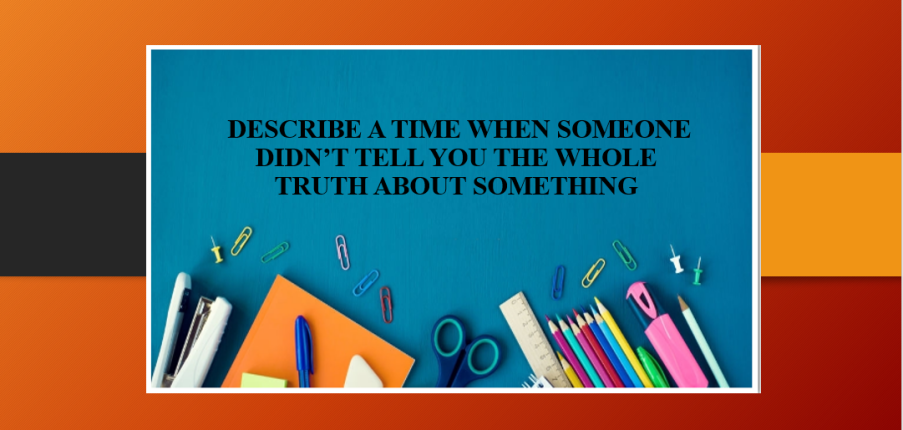Describe a time when someone didn’t tell you the whole truth about something | Bài mẫu IELTS Speaking Part 2+ 3
Bài mẫu IELTS Speaking Part 2 Chủ đề: Describe a time when someone didn’t tell you the whole truth about something
Đề bài
- When this happened
- What the situation was
- Who you were with
- And explain why the person didn’t tell the whole truth.
Bài mẫu tham khảo
So I’m going to talk about a time when my brother told me a half-truth that just happened recently actually.
My brother is a trickster who is able to lie without blinking an eye. Three months ago, he told me that he was super broke and asked to “borrow” some cash to pay for the air ticket that he already booked. Empathizing with his situation, I decided to give him the benefit of the doubt and gave him some money without asking him to pay me back because, you know, he is family and also jobless. He was thankful and brought me a bunch of gifts from his trip. I was quite happy as I thought my brother had finally grown up and became a more mature person. How naive I was!
During the next family gathering, I brought up the story to my parents, praising my brother for his maturity. My mom’s face dropped and she immediately looked at my brother in disbelief. It turned out that my brother only told me half of the truth. He was really in desperate need for some cash, but he asked both my mom and I, received money from both of us and ended up with twice the amount he needed. The ending was predictable: two hours of being scolded and grounded for one month. I was neither surprised nor sorry for him. He
reaped what he sowed, you know.
Từ vựng
- Without blinking an eye: không chút cảm xúc.
- To be broke: cháy túi.
- Give sbd the benefit of the doubt: quyết định tn tưởng ai mặc dù mình vẫn còn nhiều nghi ngờ.
- You reap what you sow: hứng chịu những ảnh hưởng của hành động của mình.
Bài mẫu IELTS Speaking Part 3
1. What are the advantages and disadvantages of telling lies?
It’s obvious that telling lies normally has many problems, such as forming a bad, or morally bad, habit of trying to avoid letting others know about our wrongdoings. For example, a kid steals some money from his parents to buy a toy, but he doesn’t admit doing so, or a student doesn’t do his homework cuz he’s lazy, but he tells his teacher he’s busy doing a lot of household chores.
But sometimes telling a lie is beneficial, like telling a cancer patient that she’s got a health problem because of old age rather than cancer, and that the doctor’s prognosis is not serious. A lie like that is sometimes called a white lie.
2. Have your parents ever told lies?
I think they have, but not to do me, my sister, or others any harm, as far as I know. Like, you know, they told me and my sister that Santa Claus was real, he came to visit us every year all the way from the North Pole and he would give us presents we wished if we were good girls. Funny things like that. As for other lies for other purposes, I’m not really sure if they have told any.
3. Should adults share with their children how to avoid being lied to by others?
This question is a little tricky. The point here is parents should always teach their children some basic techniques in how to tell whether someone is telling the truth or a lie based on things like facial expressions. Sometimes an adult may be telling a child a small lie for fun, together with an eye wink, so the child needs to know that in order not to be fooled by such a funny lie. But actually, this issue is really complicated cuz even adults may not be able to distinguish which is which.
4. What do listeners benefit from telling lies?
When it comes to how lies benefit listeners, I can only think of white lies where the teller is trying to conceal the truth for fear that the listener, who is a patient or an old family member, may be seriously affected by the sad truth. Ah, there are also white lies where the listener is a woman and the teller is a man who doesn’t wanna hurt her because of a certain brutal truth about her age or beauty. The main purpose of telling white lies in these situations is to comfort the listener rather than to deceive them, so it’s kinda good for them.
5. Telling lies is sometimes seen as a way to justify a wrongdoing. Do you think so?
I guess it’s not really a morally good way, but it’s so common these days. Often times, people tend to make up a story, or an excuse to be exact, when they do something wrong, or illegal, or against a certain policy. This is normally used to explain why something bad happens and to make the relevant situation more acceptable. A typical case is to blame heavy traffic, or traffic congestion, for causing an employee to be late for work. This type of excuse is so commonly used that nearly everyone today knows that it’s actually not working very well anymore.
Xem thêm các tài liệu Tiếng Anh hay, chi tiết khác:
TOP Việc làm "HOT" dành cho sinh viên:



